4 Online Course Platforms: EdX, Udemy, Coursera, Skillshare (How Do They Compare?)
Author: Andrea G
Go to Source
Looking for online courses? Wondering which online learning platform is best?
Here at Learning Where, the specialty is online learning. You can go and browse through the “Course of The Day” tag, recommending the most noteworthy courses. Or, you can go and check the Top 10 resources to learn how to draw, from all over the internet.
But if you’re simply wondering where to start, and a breakdown of all these platforms, you’re in the right place.
So what are 4 of these platforms?
- Coursera
- EdX
- Udemy
- Skillshare
The main difference between all of them is that two of them are university-based, and the other two are not. Anyone can take the courses, but some of them are free and some are not.
So, let’s break them down one by one, yes?
Udemy
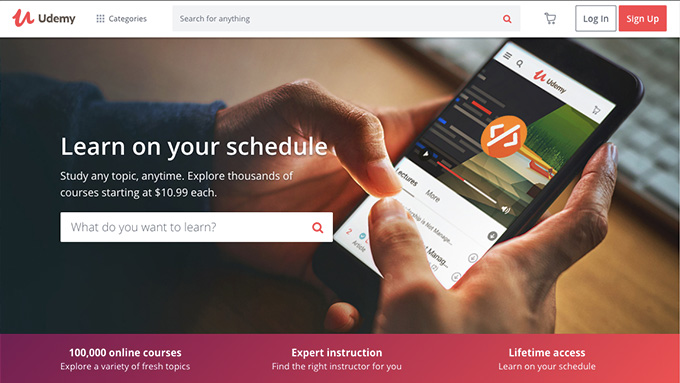
- Anyone can upload courses.
- Course price varies, ranging from $9.99 to $199.99 (depending on whether there are discounts or not).
- Variety of courses in many fields: photography, design, cooking, coding, business, productivity, music, and more.
- Languages: depends on the course (most are in English), but there’s a variety of languages.
- Available to watch offline? Yes, in-app.
Udemy. Undoubtedly one of the most popular learning platforms out there, with over 100k courses. If 100k sounds like a lot, that’s because anyone can upload courses; which can be a good thing or a bad thing. It’s good because of the variety, but also, quality can take a hit. Before signing up for a course, take a good look to make sure it’s what you’re looking for. Look through the reviews, the description, the preview videos that will often be available, so you can get a good feel of what to expect. And for good measure, why not browse through LearningWhere reviews, too? Whatever the case, Udemy offers a 30-day-money-back-guarantee on all courses. And, the variety of topics taught is arguably the most diverse of all the platforms in this list.
-
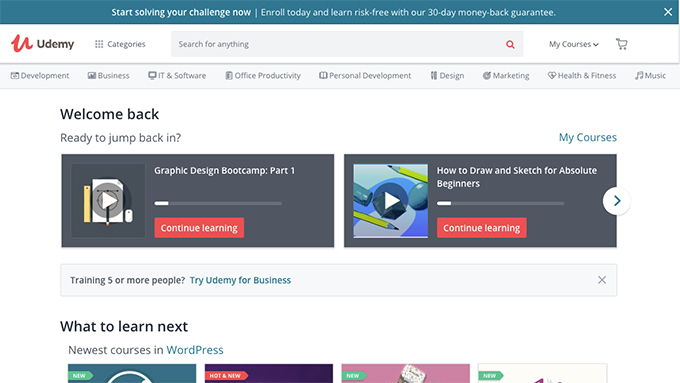
Udemy’s welcome page, once you sign in -
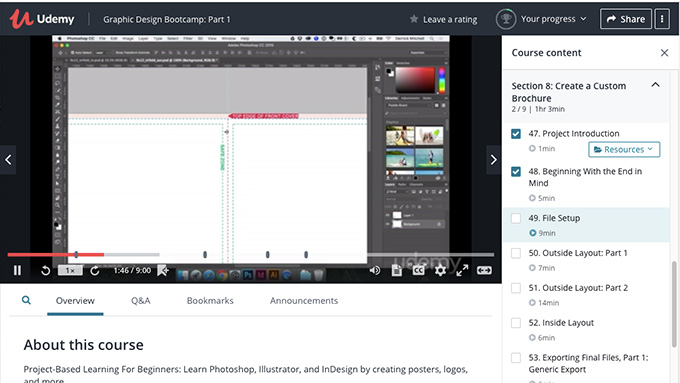
Inside a course
LearningWhere writer’s note: On my own account, I’ve signed up to a few courses and have had positive experiences. They each cost, though, and that’s why I’ve taken less courses there than from other platforms. I’m more familiar with EdX and Coursera for that reason. However, what I like about Udemy is the user experience, as I feel that it runs more smoothly and feels more modern than the other three. But that’s a matter of personal opinion.
Coursera

-
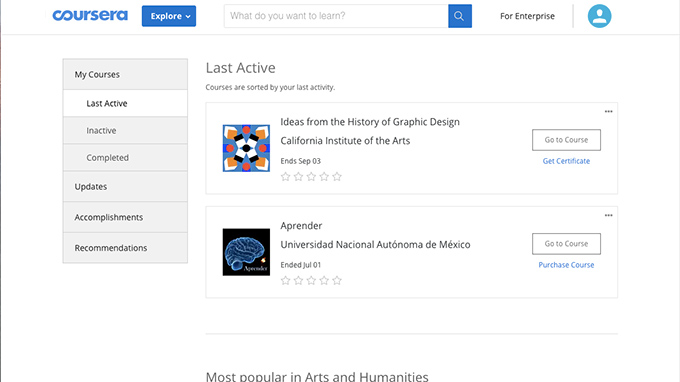
Your Coursera page when you sign in -
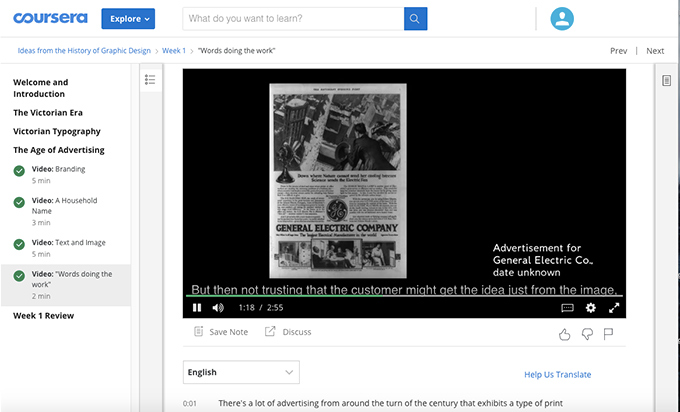
Inside a course
- Courses from top universities, but also degree programs.
- Free access to most courses, but you must pay for certificates of completion (usually starting from $49).
- Variety of subjects, but slightly narrower scope than Udemy or Skillshare: history, philosophy, math, music and art, languages, computer science (think more “academic” subjects).
- Transcripts of each video, in most courses.
- Languages: universities from all around the world participate, so you can expect courses in different languages depending on what you’re looking for.
Coursera is another popular platform. Here, universities develop the courses, so the volume is significantly less than in other platforms. They offer 880+ free courses as of the time of this post, contrasting with Udemy’s 100k. Naturally, the quality of the courses does tend to be more “professional”, by traditional standards. That’s not to say all the courses are perfect, though. But there is the advantage that you can sign up and try most of them without having to pay. You won’t find many practical courses, though, and that’s a downside of this platform.
Additionally, they offer master’s degrees in business, computer science, data science, and public health; as well as certificates in Google IT support, applied project management, and more. These are possible through direct partnerships with the universities, and institutions. That’s to say, you wouldn’t get a degree from some ‘Coursera university’, but from the university offering the degree on their platform.
LearningWhere editor’s note: Coursera is the platform I’m most familiar with, and have taken the most courses from. I have mostly good things to say, but I do wish their app would have all the features that their site offers.
EdX

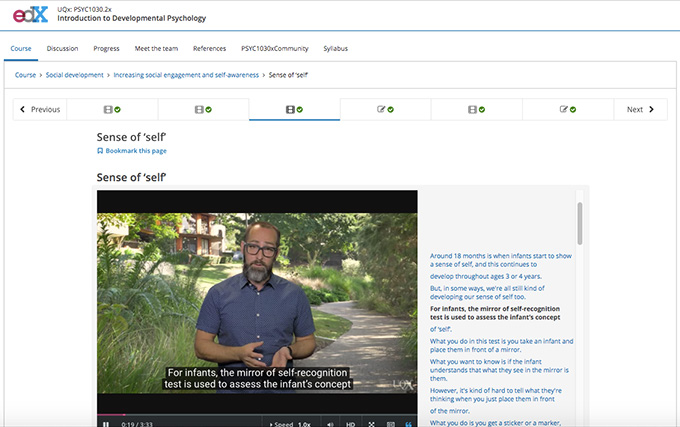
- Courses from top universities, and some degrees offered (similar to Coursera).
- 100+ professional certificate programs, in different languages.
- Most courses offer free enrollment, with an optional certificate of completion (again, like Coursera, prices start at $49).
- “XSeries” (a type of collection of courses), and similar programs have price tags starting at $147.
- Course subjects include: science and math, psychology, history, education, music, and other signature “academic” topics.
- Varied subjects, but focus on professional skills and training.
- Languages: Most courses (2000+) are in English, but there are options in Spanish, Chinese, French, Italian, and more. There’s also a Spanish version of the website.
- Transcripts of each video, in most courses.
EdX is similar to Coursera, in that it’s university-based. Their website displays 2700 available courses, but approximately 1000 of them appear as “archived” (which means they aren’t “active”, so you can’t apply for certificates). Nonetheless, the catalog is large. And you can access most of their courses for free.
The only time you’d need to pay is if you want to receive a certificate, or if you enroll in one of their programs. For the most part, EdX is largely aimed at professional audiences. Browsing through their courses, a large majority are “Business & Management” and “Computer Science”. A big selling point is the certificates they offer, and the value they can add to people’s careers. So, as one might expect, these are the options that cost. In addition to masters degrees, they offer over 100 professional certificate programs, and “XSeries” programs.
Skillshare

- Anyone can upload courses.
- $15.99 per month (or $99 per year/$8.25 per month).
- Unlimited access to courses, once you have the membership.
- Mostly practical fields: graphic design, creative writing, arts & crafts, studying techniques, content creating, fashion, and more.
- Languages: Mostly English.
As the name suggests, Skillshare is more directed towards skills. Instead of topics like history, you will find online courses on how to /study/ better, for example. Or more specifically, how to take better notes, for example.
(Psst. You can check our full review here!)
As with Udemy, the quality can be hit or miss, because technically anyone can upload classes. Classes tend to be on the short side, some even 15 minutes long. The good thing about short classes is that they’re easy to go through, and you’re more likely to dive right in.
What sets Skillshare apart is that you don’t purchase individual classes, and you don’t pay for any certificates. Rather, you pay a monthly or yearly fee, and have unlimited access.
So there you have it! Which platform do you prefer? If you’ve had previous experience with them, or if you have any questions, let us know in the comments! We hope this was helpful.
Writer’s note: Though there are more platforms of online courses out there, we chose these 4 because as the writer, I’ve taken courses from each of these platforms and can vouch for each.
The post 4 Online Course Platforms: EdX, Udemy, Coursera, Skillshare (How Do They Compare?) appeared first on Learning Where.
